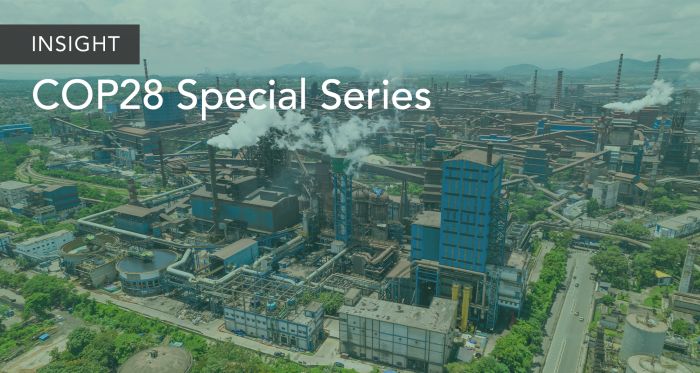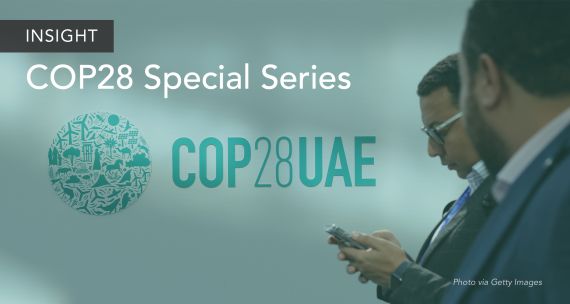The Takeaway
At the 28th Conference of the Parties (COP28) to the UN Framework Convention on Climate Change (UNFCCC), 123 countries, including Canada, pledged to triple global renewable energy capacity by 2030. While well-intentioned, the Global Renewables and Energy Efficiency Pledge has been criticized for its lack of commitment to phasing out fossil fuels — essential to preventing global temperatures rising above 1.5 C thresholds — and for its lack of universality. Several major emitters in Asia, including China and India, have abstained from the Pledge despite making similar commitments elsewhere.
In Brief
- The Pledge is a commitment by signatories to triple the world’s installed renewable energy capacity and to double the annual rate of energy efficiency improvements by 2030. If implemented, it could potentially close one-third of the ‘mitigation gap’ — the difference between the world’s emissions pathway, based on current climate ambitions, and what is required to prevent crossing the 1.5 C threshold outlined in the Paris Agreement.
- Several major emitters, including India, China, and rapidly growing Southeast Asian economies such as Indonesia and Vietnam, have yet to commit to the Pledge. However, outside of the UNFCCC, these countries have committed to expanding their renewable energy capacities.
- India’s 14th National Energy Plan is expected to set the country on a path to triple its renewable capacity by 2030. New Delhi reiterated its commitment to do so at the 2023 G20 Summit, along with other G20 members including China. The rate of India’s renewable electricity is advancing faster than any other major economy.
- China’s abstention from the Pledge also came as a surprise given its participation in the U.S.-China bilateral climate deal just weeks prior to COP28’s commitments to triple renewables. Nevertheless, China remains the largest global producer of clean technology. China is also on track to meet its renewable capacity target by 2025 — five years ahead of schedule.
- Indonesia and Vietnam have each struck multi-billion-dollar Just Energy Transition Partnerships with the International Partners Group to accelerate the deployment of renewables domestically.
Implications
China and India have reason for reluctance on renewables. Despite China and India’s surge in renewables, their reluctance to sign the COP28 Pledge may stem from the call to phase down unabated coal plants and end new coal-power investments, which would place major restrictions on both economies. In 2022, close to 60 per cent of China’s electricity was coal-generated, while in India, the figure stood at 74 per cent. Additionally, the Pledge calls for countries to double their energy efficiency. China, an energy-intensive largely manufacturing economy, may struggle to meet that target.
Southeast Asia also relies on coal, but the region is increasing its efforts to adopt renewable energy. Some Southeast Asian countries have also opted out of the Pledge due to similar concerns about whether renewables can effectively replace coal in the short term. According to the International Energy Agency, more than 40 per cent of Southeast Asia’s power generation in 2021 was coal-derived. Fossil fuels, meanwhile, accounted for 60 per cent of Indonesia’s electricity mix and 30 per cent of Vietnam’s in 2021. The region’s energy demands are also rising at a pace that existing energy infrastructure is struggling to meet.
What’s Next
- Multistakeholder initiatives to augment decarbonization efforts
While decarbonization efforts are often spearheaded by states, the inclusion of the private sector is just as critical. As part of the C$200-million Climate Fund for the Private Sector in Asia II, the Canadian government has helped fund private-sector initiatives to improve local energy infrastructure and expedite the deployment of renewables. Together with the Asian Development Bank, the investment projects include a floating solar farm in Vietnam and a wind farm in Laos, the latter the largest of its kind in Southeast Asia.
In 2021, Surbana Jurong, a Singaporean government-owned consultancy company, announced a sustainability-linked bond, committing companies and individuals to sustainable practices as mandated by the company’s Sustainable Finance Framework. The first of its kind in Southeast Asia, the proceeds of the bond will finance Surbana’s future green investments and green initiatives.
2. Rapid renewables uptake leads to greenwashing concerns
The race to decarbonize is driving global demand for the critical minerals essential to the manufacturing of low-carbon technologies. However, mining these minerals can lead to other, often devastating, problems such as deforestation and involuntary displacement of communities. The challenge for Southeast Asia is to meet the demand for critical minerals without resorting to ‘greenwashing,’ or the illusion of supporting sustainability while, in fact, engaging in environmentally and socially destructive activities. A recent report by Global Witness unearthed the implications of Southeast Asia’s race to extract these minerals leading to the intimidation or death of environmental activists. Canada, per its Critical Minerals Strategy, is working with Southeast Asian partners to strengthen supply chain resilience. The recent scoping study on critical mineral supply chains by the Winnipeg-headquartered International Institute for Sustainable Development, partly funded by Canada, is a step towards understanding the role ASEAN can play in driving the industry towards more sustainable standards.
• Produced by APF Canada's Southeast Team: Hema Nadarajah (Program Manager), Sasha Lee (Analyst), and Alberto Iskandar (Analyst). Editor: Ted Fraser. Graphic Design: Chloe Fenemore







